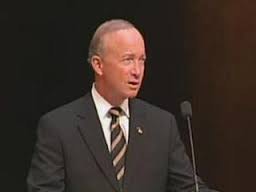 Former Indiana Governor Mitch Daniels, who took over in January as president of Purdue, is paid $420,000 a year with the potential to earn an additional $126,000 tied to such things as lowering students’ debt.
Former Indiana Governor Mitch Daniels, who took over in January as president of Purdue, is paid $420,000 a year with the potential to earn an additional $126,000 tied to such things as lowering students’ debt.
And like a small but growing number of his counterparts around the country, O’Donnell has a new incentive to meet these goals: His salary partly depends on it.
“College presidents need to be accountable,” said O’Donnell, a self-professed advocate of the idea that presidential pay be used to reward good performance, and whose board of trustees has recommended that he get the relatively modest maximum allowable incentive bonus of $7,390 for this, on top of his $211,150 base pay.
Taking a page from the corporate playbook, public and private college boards are beginning to tie at least a portion of annual merit raises to how well presidents and their campuses meet performance targets.
“Corporate concepts are just starting to drift into academia, and they have to,” said Stephen Pollack, a partner in the San Francisco office of the human resources consulting firm Mercer, who specializes in nonprofit organizations, including in higher education. “Institutions can’t afford not to have competent people in these jobs.”
“Institutions can’t afford not to have competent people in these jobs.” – Stephen Pollack
The trend exposes the reality that presidential evaluations historically have been almost a formality at many colleges, and raises often rubber-stamped, said Patrick Callan, president of the National Center for Public Policy and Higher Education. The process appears to be undertaken “just to justify extravagant salaries, or is way too focused on fundraising,” he said.




















